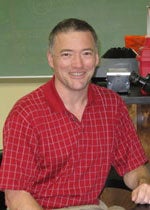Daniel W. Martin

Research Associate Professor
BS, The University of Texas at Tyler
MS, The University of Texas at Tyler
PhD, The University of Texas Health Science Center at San Antonio
Phone:252-744-3798
Fax: 252-744-3104
Email: martinda@ecu.edu
Research
Legionella pneumophila is a facultative intracellular pathogen and the causative agent of Legionnaires’ disease, a potentially fatal pneumonia. In the human lung, L. pneumophila invades and replicates within the pulmonary macrophages. Protozoa, which harbor the bacteria within contaminated water systems, are a significant reservoir of infection that have been linked to outbreaks of disease. The interaction of L. pneumophila with both amoebae, the protozoa most commonly associated with L. pneumophila, and macrophages is very similar. Following uptake, L. pneumophila alters vesicular trafficking to avoid phagosome-lysosome fusion and to subvert the bactericidal capabilities of the host cell. Replication within the host cell continues until the cell dies and releases the bacteria, which then initiate additional rounds of infection. My laboratory is currently studying genes activated during the intracellular growth of L. pneumophila in Acanthaboeba castellanii, a protozoan host, and in human macrophages. We expect these genes to be the best candidates for virulence determinants. Like most bacterial pathogens, L. pneumophila carefully regulates the expression of virulence. Previous studies have found that growth within amoebae enhanced the virulence of L. pneumophila. This phenotypic change in virulence was mirrored by changes in morphology, physiology, and gene expression. In order to identify genes that are activated within host cells we have utilized a promoter trapping technique known as differential fluorescence induction (DFI). This technology employs fluorescence activated cell sorting to select clones that are activated during infection of host cells from a random L. pneumophila promoter library fused to the green fluorescent protein. Using DFI, we have isolated a collection of genes that are specifically activated during infection of the host cell. This includes several novel genes that may contribute to virulence. Current and future studies are aimed at the complete molecular characterization of each gene, which will allow us to better understand the adaptation of L. pneumophila to this unique environment. This will include: (i) promoter mapping; (ii) identification of specific environmental cues necessary for regulation of the individual genes; (iii) identification and analysis of regulatory elements; and (iv) mutational analysis of individual genes to access their contribution to virulence in different models of infection. The results from these studies will give us insight into the contributions that these genes make to the host-pathogen interaction and may lead to new strategies for improved treatment and prevention of Legionnaires’ disease in humans.
Publications
Schurr, M. J., D. W. Martin, M. H. Mudd, and V. Deretic. 1994. Gene Cluster Controlling Conversion to Alginate-Overproducing Phenotype in Pseudomonas aeruginosa: Functional Analysis in a Heterologous Host and Role in the Instability of Mucoidy. Journal of Bacteriology. 176:3375-3382.
Martin, D. W., M. J. Schurr, H. Yu, and V. Deretic. 1994. Analysis of Promoters Controlled by the Putative Sigma Factor AlgU Regulating Conversion to Mucoidy in Pseudomonas aeruginosa: Relationship to Stress Response. Journal of Bacteriology. 176(21):6688-6696.
Deretic, V., M. J. Schurr, J. C. Boucher, and D. W. Martin. 1994. Conversion of Pseudomonas Aeruginosa to Mucoidy in Cystic Fibrosis: Environmental Stress and Regulation of Bacterial Virulence By Alternative Sigma Factors. Journal of Bacteriology. 176:2773-2780.
Yu, H., M. J. Schurr, J. C. Boucher, J. M. Martinez-Salazar, D. W. Martin, and V. Deretic. 1996 Chapter 34: Molecular Mechanisms of Conversion To Mucoidy in Pseudomonas aeruginosa. Molecular Biology Of Psuedomonads. Pages 384-397. Edited by T. Nadazawa et. al. ASM Press, Washington, DC.
Tompkins, L. S., D. Martin, A. Polesky, P. Edelstein, and S. Falkow. In Press. Interaction of Legionella pneumophila with Eukaryotic cells. Proceeding of the 50th Meeting of the German Society of Hygiene and Microbiology and the 25th Meeting of the German Society of Infectious Diseases. Einhorn-Presse Verlag, Reinbek.
Staff
| Name | Title | Location | Phone |
|---|---|---|---|
| Craig, Jane | Temp Lab Assistant | Biotech 119 | 252-744-3139 |